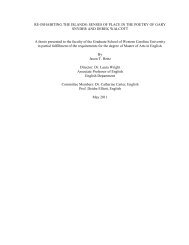SUMMERS, KAREN CRADY, Ph.D. Reading Incest - The University ...
SUMMERS, KAREN CRADY, Ph.D. Reading Incest - The University ...
SUMMERS, KAREN CRADY, Ph.D. Reading Incest - The University ...
Create successful ePaper yourself
Turn your PDF publications into a flip-book with our unique Google optimized e-Paper software.
28<br />
of the king, whose primary duty is to succor his people through the right sort of love. A<br />
pattern begins to emerge that links the Prologue to the rest of Confessio Amantis<br />
structurally while the problem of what constitutes love unifies it thematically: <strong>The</strong><br />
organization of tales in the books echoes the structure of the Prologue 7 , for the tales are<br />
told in an order of sins with least harmful effects to those with the most harmful. In<br />
addition, in the Prologue, the single books, and the work as a whole, there is a line of<br />
rising intensity, a climactic interruption by a tale of some distress, and then a remediating<br />
turn so that Prologue and book and poem end on a hopeful note. An in-depth look at<br />
Book one will demonstrate the pattern.<br />
Book one, dedicated to pride and its five branches—Hypocrisy, Murmur and<br />
Complaint, Presumption, Boasting, and Vainglory—contains much in the way of advice<br />
to the king: a king should avoid hypocrisy (the Tale of Mundus and Paulina), be true to<br />
his word (<strong>The</strong> Tale of Florent), should retain the dignity of his office (<strong>The</strong> Trump of<br />
Death), and avoid vainglory (Nebuchadnezzar’s Punishment). <strong>The</strong> argument seems clear:<br />
a good king, with right governance, can unify people through appropriate and kynde love.<br />
<strong>The</strong>se cautionary tales exemplify the ways that a right-thinking king should behave,<br />
bringing peace rather than discord to his people. In querying Amans, Genius begins with<br />
the misuse of the senses, and relates the Tale of Acteon, taken from Ovid, to illustrate<br />
unwise use of the eyes, 8 because<br />
7 Baker and Peck note the pattern of increasing intensity of the sin of incest throughout the books; I find<br />
that this pattern commences even in the Prologue.<br />
8 Peck notes the classical idea of the eye as the “most important sense for human revelation. . . the principal<br />
sense organ for guiding reason. Augustine’s three steps toward virtue (visio, contemplation, actio) mark<br />
also the three steps toward sin. In both instances the process begins with the eye’s response to beauty or<br />
the desirable, which in turn stimulates the will and desire” (313 fn775). Plato explains”why the eye is
















